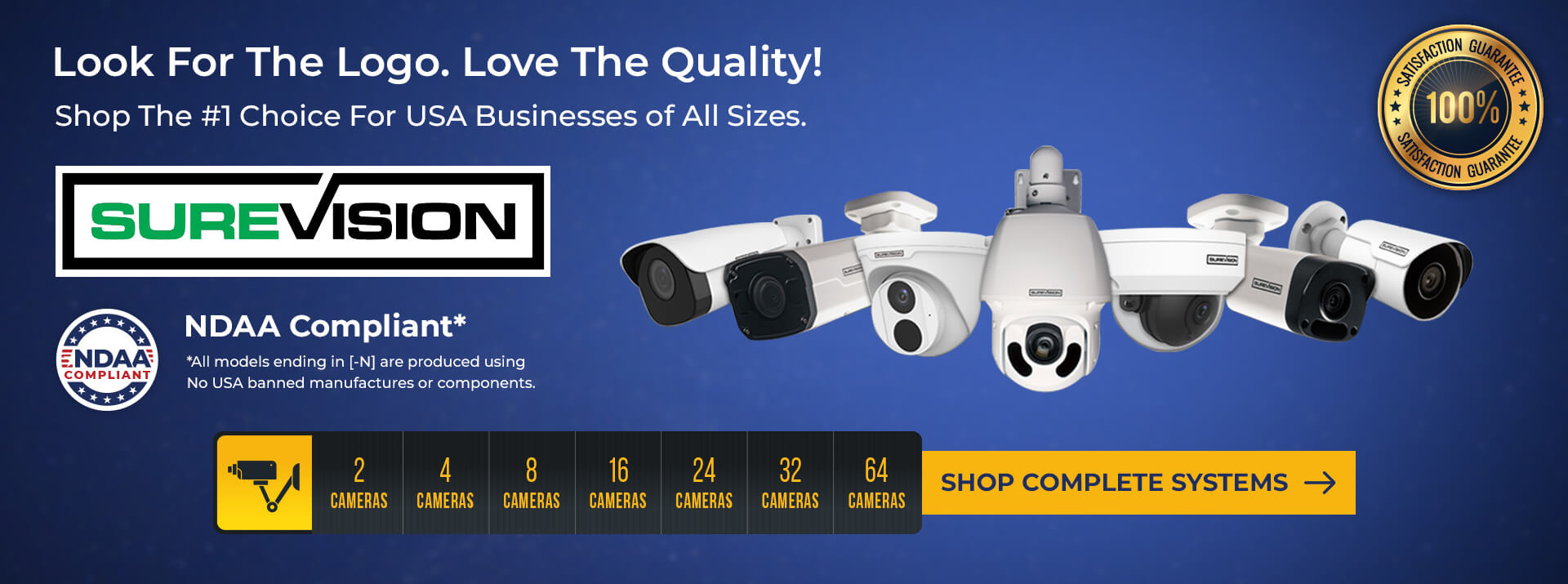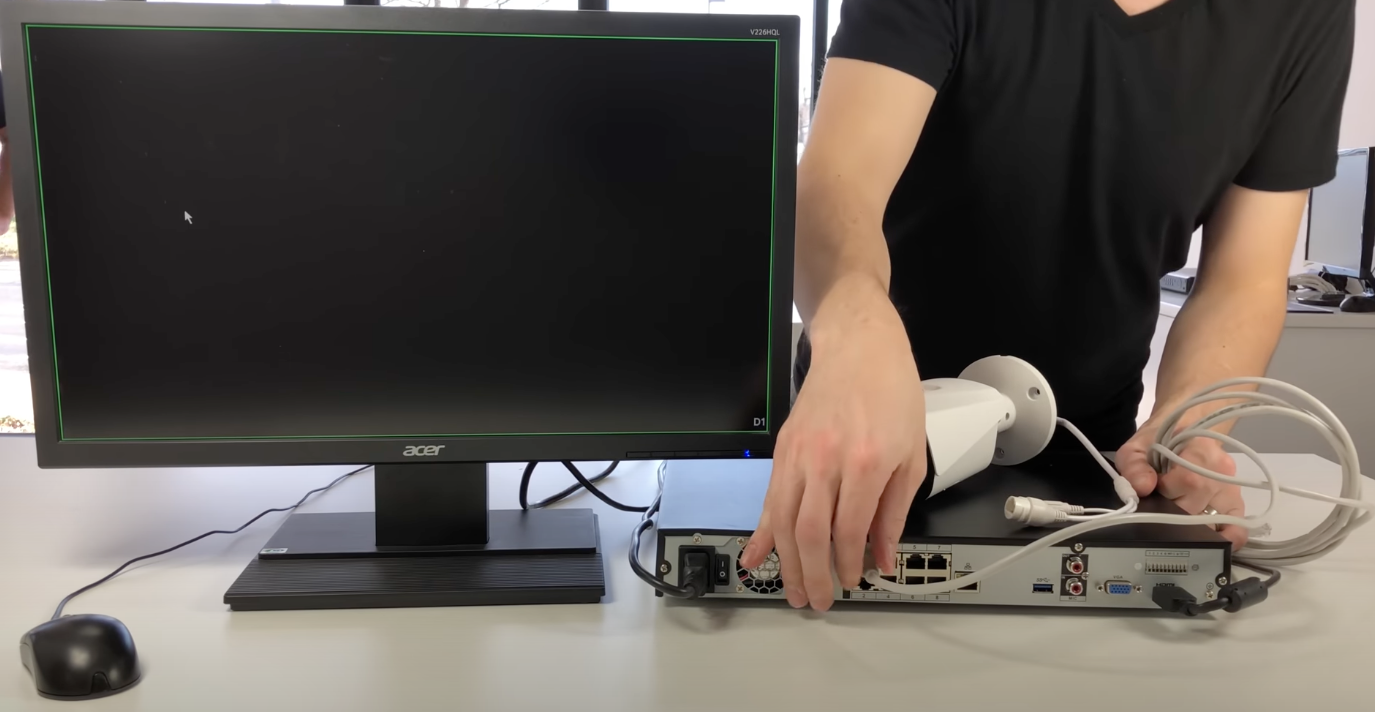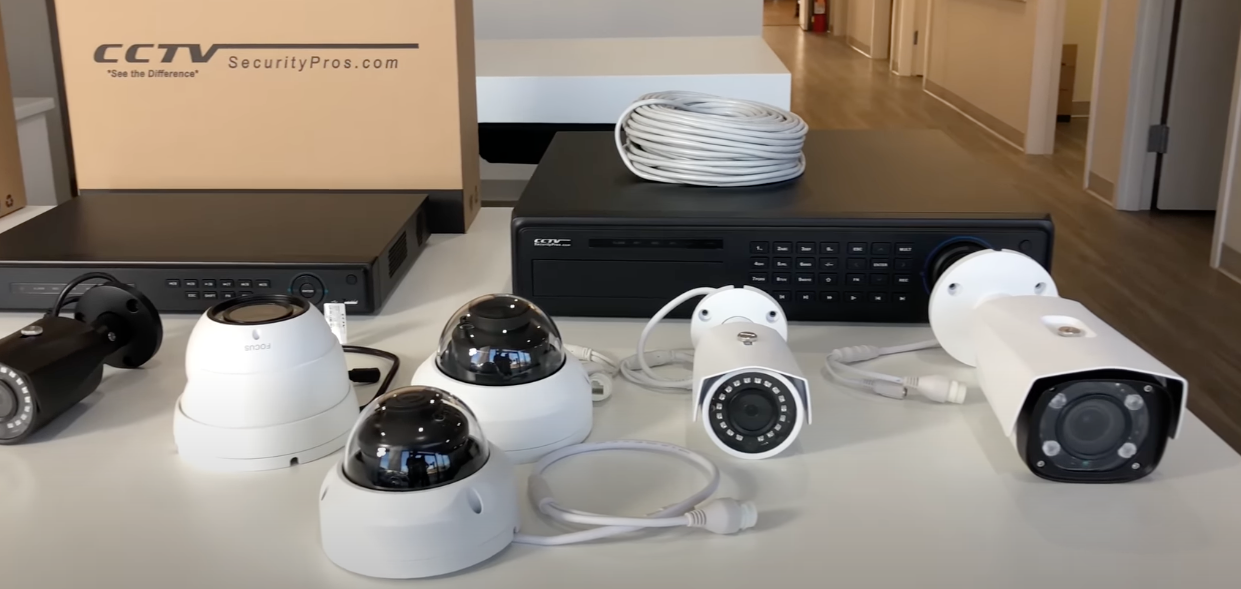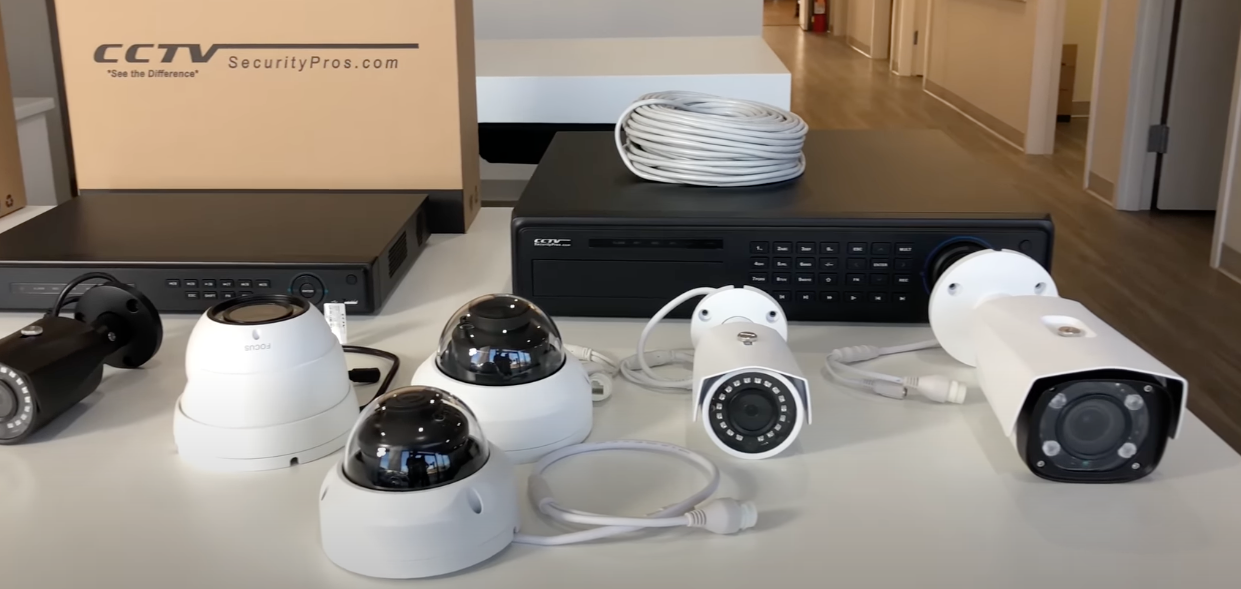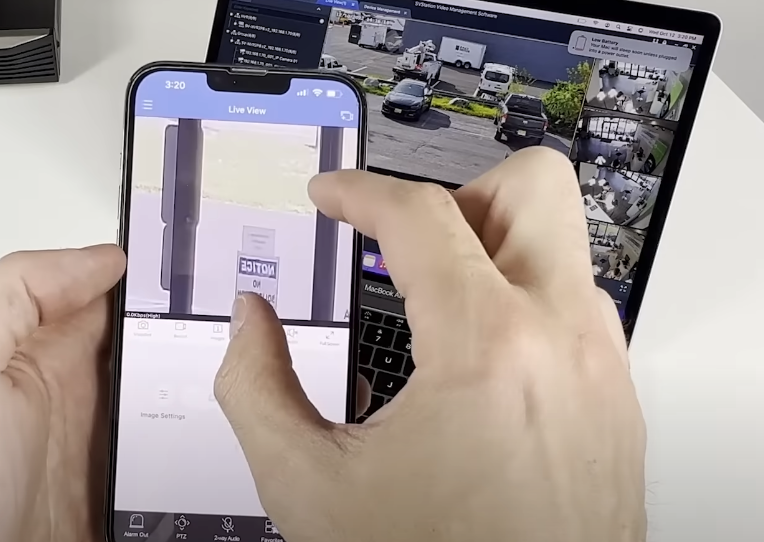Home Security Camera - WIred for Security
Posted by Gregory Derouanna, MBA on Sep 28, 2024
Home Security Camera Systems -
Why WIred Surveillance?
Are you worried about the safety of your home and loved ones? In today's uncertain world, feeling secure in your own space has never been more crucial. While many homeowners are turning to wireless security solutions, there's a robust, reliable alternative that often goes overlooked: wired home security camera systems.
Imagine a security system that's always on, immune to Wi-Fi interference, and virtually unhackable. That's the power of wired security cameras. They offer unparalleled stability and crystal-clear footage, ensuring you never miss a moment when it matters most. But with so many options available, how do you choose the right system for your needs?
In this comprehensive guide, we'll explore everything you need to know about wired home security camera systems. From the advantages of hardwired setups to the key features you should look for. You will be equipped with the knowledge to make an informed decision and take the first step towards a safer, more secure home. Let's discover why wired might be the way to go for your home security needs!
As you research and look into a security camera system for your home it's crucial to understand the distinct advantages that wired systems offer. These benefits set them apart from their wireless counterparts and make them a preferred choice for many homeowners and businesses alike. Let's explore the key advantages of wired home security cameras in detail.
A. Enhanced Security Against Hacking
One of the most significant advantages of wired home security cameras is their enhanced protection against hacking attempts. In an age where cybersecurity threats are increasingly sophisticated, the security of your surveillance system is paramount.
How Wired Systems Protect Against Hacking
- Physical Connection: Wired cameras rely on a physical connection to transmit data, making it significantly more challenging for hackers to intercept the signal remotely.
- Closed Circuit: Unlike wireless systems that broadcast signals through the air, wired systems operate on a closed circuit, reducing the attack surface for potential intruders.
- No Wi-Fi Vulnerabilities: Wired cameras don't rely on Wi-Fi networks, eliminating vulnerabilities associated with weak Wi-Fi passwords or outdated router firmware.
- Encryption: Many modern wired systems employ advanced encryption protocols for data transmission, adding an extra layer of security.
While no system is entirely immune to hacking, the inherent design of wired camera systems provides a significant security advantage. This makes them an excellent choice for those prioritizing data protection and privacy in their home security setup.
B. Higher Video Quality
Another compelling advantage of wired home security cameras is the superior video quality they offer. This high-quality footage can be crucial in identifying intruders, monitoring activities, or providing evidence in case of incidents.
Factors Contributing to Better Video Quality
- Consistent Bandwidth: Wired connections provide a stable and dedicated bandwidth, ensuring consistent video quality without fluctuations.
- Higher Resolution Support: The direct connection allows for the transmission of higher resolution video without compression, resulting in clearer and more detailed images.
- Frame Rate Stability: Wired systems can maintain higher and more stable frame rates, crucial for smooth video playback and capturing fast-moving objects.
- Color Accuracy: With more data transmission capability, wired cameras often provide better color accuracy and dynamic range.
The superior video quality of wired systems is particularly beneficial in scenarios where detailed footage is crucial, such as identifying license plates or facial features. This makes them ideal for both residential and commercial security applications where video evidence quality is paramount.
C. Reliable and Stable Connection
Reliability is a cornerstone of any effective security system, and wired home security cameras excel in this aspect. The stability of their connection ensures that your surveillance system is always operational when you need it most.
Factors Contributing to Connection Stability
- Physical Connection: The hardwired nature of these systems eliminates issues related to wireless signal interference or dropouts.
- Weather Resistance: Wired connections are less susceptible to weather-related disruptions that can affect wireless signals.
- Consistent Power Supply: Being directly connected to a power source, wired cameras don't face power-related disconnections.
- Scalability Without Signal Degradation: Adding more cameras to a wired system doesn't typically degrade the signal quality or stability.
Benefits of a Stable Connection
- Continuous Monitoring: A stable connection ensures uninterrupted surveillance, crucial for security purposes.
- Reduced False Alarms: Stable connections minimize the chances of false alarms triggered by signal dropouts.
- Reliable Remote Viewing: When accessing your cameras remotely, a stable connection provides a more dependable live feed.
- Consistent Recording: For systems with continuous recording, a stable connection ensures no gaps in footage.
The reliability of wired systems makes them particularly suitable for critical security applications where constant, uninterrupted monitoring is essential. This could include high-security areas, valuable inventory monitoring, or surveillance of entry points.
D. No Battery Replacement Needed
One of the often-overlooked advantages of wired home security cameras is the absence of battery-related concerns. This feature not only adds to the convenience of the system but also contributes to its overall reliability and cost-effectiveness in the long run.
Implications of Battery-Free Operation
- Continuous Operation: Wired cameras can operate 24/7 without the need for battery changes or recharging.
- Consistent Performance: There's no degradation in performance due to low battery levels, ensuring consistent operation at all times.
- Reduced Maintenance: The absence of batteries eliminates a significant maintenance task, saving time and effort.
- Environmental Considerations: By not requiring battery replacements, wired systems contribute to reducing electronic waste.
Cost and Convenience Benefits
- Long-Term Savings: While the initial setup might be more involved, the absence of battery replacements leads to cost savings over time.
- Peace of Mind: There's no risk of missing crucial footage due to dead batteries.
- Suitability for Remote Locations: Ideal for monitoring areas where frequent battery changes would be inconvenient or impossible.
- Higher Capacity for Features: Without power constraints, wired cameras can support more power-intensive features consistently.
Comparison of Power Management: Wired vs. Battery-Powered Wireless
The elimination of battery-related concerns makes wired systems particularly advantageous for long-term, high-use scenarios. They are ideal for businesses, large properties, or any situation where consistent, uninterrupted operation is crucial without the need for frequent maintenance.
Types of Wired Security Camera Systems for Home
As we delve deeper into the world of wired home security cameras, it's crucial to understand the different types available in the market. Each type has its own set of features, advantages, and potential drawbacks. In this section, we'll explore three main categories of wired security camera systems: IP cameras, analog cameras, and HD-over-coax cameras. By the end of this discussion, you'll have a comprehensive understanding of each type, enabling you to make an informed decision about which system best suits your home security needs.
IP Cameras
IP (Internet Protocol) cameras have revolutionized the security camera industry with their advanced features and superior image quality. These cameras use your home's network infrastructure to transmit and receive data, making them a popular choice for modern home security systems.
How IP Cameras Work
IP cameras capture and send video footage over an IP network, such as your home's local area network (LAN) or the internet. Here's a simplified breakdown of the process:
- The camera captures video footage.
- The footage is digitized and compressed within the camera.
- The compressed data is sent over the network to a Network Video Recorder (NVR) or a cloud-based storage system.
- The NVR or cloud system stores the footage and makes it accessible for viewing on various devices.
Advantages of IP Cameras
- High Resolution: IP cameras typically offer higher resolution than traditional analog cameras, with many models capable of 4K or even 8K resolution.
- Remote Access: You can easily access your camera feeds from anywhere in the world using a smartphone, tablet, or computer.
- Advanced Features: Many IP cameras come with built-in analytics, motion detection, and facial recognition capabilities.
- Scalability: It's relatively easy to add more cameras to an IP system as your needs grow.
- Power over Ethernet (PoE): Many IP cameras can be powered through the same Ethernet cable that carries data, simplifying installation.
Disadvantages of IP Cameras
- Higher Initial Cost: IP cameras and their associated equipment tend to be more expensive upfront compared to analog systems.
- Network Dependency: If your network goes down, so does your camera system.
- Bandwidth Requirements: High-resolution IP cameras can consume significant network bandwidth, potentially affecting other network-dependent devices in your home.
Installation Considerations for IP Cameras
When installing IP cameras, keep the following points in mind:
- Network Infrastructure: Ensure your home network can handle the additional bandwidth requirements.
- PoE Switch or Injector: If using PoE cameras, you'll need a PoE switch or injector to power the cameras.
- Camera Placement: Consider lighting conditions, areas of interest, and potential blind spots when placing cameras.
- Weather Protection: For outdoor cameras, ensure they have an appropriate IP (Ingress Protection) rating for your climate.
Analog Cameras
While IP cameras represent the cutting edge of security camera technology, analog cameras have been the workhorses of the security industry for decades. These tried-and-true systems still have their place in home security, especially for those looking for a more budget-friendly option.
How Analog Cameras Work
Analog cameras capture video and transmit it as a continuous analog signal over coaxial cable. Here's a basic overview of the process:
- The camera captures video footage.
- The analog signal is sent over coaxial cable to a Digital Video Recorder (DVR).
- The DVR converts the analog signal to digital, compresses it, and stores it.
- The stored footage can be viewed on a monitor connected to the DVR or accessed remotely if the DVR has network capabilities.
Advantages of Analog Cameras
- Lower Initial Cost: Analog cameras and their associated equipment are generally less expensive than IP systems.
- Simplicity: Analog systems are straightforward to install and operate, making them user-friendly for those less tech-savvy.
- Reliability: With fewer complex components, analog systems can be more reliable and less prone to network-related issues.
- Compatibility: Many analog cameras are interchangeable, allowing for easy replacement or system expansion.
Disadvantages of Analog Cameras
- Lower Resolution: Most analog cameras max out at 720p or 1080p resolution, which is lower than many IP cameras.
- Limited Features: Analog cameras typically lack advanced features like built-in analytics or facial recognition.
- Cable Length Limitations: The quality of analog signals degrades over long cable runs, limiting the distance between cameras and the DVR.
- Harder to Scale: Adding cameras to an analog system may require additional cabling and DVR capacity.
Installation Considerations for Analog Cameras
When installing analog cameras, keep these factors in mind:
- Cable Management: Plan your cable routes carefully, as each camera requires its own coaxial cable run to the DVR.
- Signal Amplifiers: For longer cable runs, you may need signal amplifiers to maintain video quality.
- Power Supply: Unlike PoE IP cameras, analog cameras typically require separate power cables.
- DVR Capacity: Ensure your DVR has enough channels and storage capacity for your planned camera setup.
HD-over-Coax Cameras
HD-over-Coax cameras represent a middle ground between traditional analog and modern IP cameras. These systems offer high-definition video quality while utilizing existing coaxial cable infrastructure, making them an attractive option for upgrading older analog systems without a complete overhaul.
How HD-over-Coax Cameras Work
HD-over-Coax technology allows high-definition video signals to be transmitted over standard coaxial cable. The process works as follows:
- The camera captures high-definition video footage.
- The HD signal is encoded and transmitted over coaxial cable.
- A special HD-over-Coax DVR receives and decodes the signal.
- The DVR stores the footage and makes it available for viewing.
Types of HD-over-Coax Technologies
There are several HD-over-Coax technologies available, each with its own specifications and capabilities:
- HD-CVI (High Definition Composite Video Interface)
- HD-TVI (High Definition Transport Video Interface)
- AHD (Analog High Definition)
- HD-SDI (High Definition Serial Digital Interface)
While these technologies are similar in concept, they are not directly compatible with each other. It's important to ensure that your cameras and DVR use the same HD-over-Coax standard.
Advantages of HD-over-Coax Cameras
- High-Definition Quality: These cameras offer 720p, 1080p, or even 4K resolution, significantly improving image quality over traditional analog systems.
- Long Cable Runs: HD-over-Coax signals can typically travel up to 1600 feet without significant degradation, surpassing the limitations of both analog and many IP systems.
- Use of Existing Infrastructure: If you're upgrading from an analog system, you can often use the existing coaxial cables, reducing installation costs and complexity.
- No Network Dependency: Unlike IP cameras, HD-over-Coax systems don't rely on your home network, reducing potential points of failure.
- Lower Latency: These systems often have lower latency than IP cameras, providing more real-time video feeds.
Disadvantages of HD-over-Coax Cameras
- Limited Advanced Features: While more advanced than traditional analog, HD-over-Coax cameras may lack some of the smart features found in high-end IP cameras.
- Potential Compatibility Issues: Different HD-over-Coax technologies are not directly compatible, which can limit your choices when expanding or upgrading your system.
- Cable Dependency: Unlike wireless IP cameras, HD-over-Coax systems still require physical cable connections.
Installation Considerations for HD-over-Coax Cameras
When installing HD-over-Coax cameras, keep these points in mind:
- Cable Quality: While you can use existing coaxial cables, higher quality cables will result in better signal transmission, especially for longer runs.
- DVR Compatibility: Ensure your DVR is compatible with the specific HD-over-Coax technology you're using.
- Power Supply: Like analog cameras, HD-over-Coax cameras typically require separate power cables.
- Future Upgrades: Consider the maximum resolution supported by your chosen technology if you plan to upgrade to higher resolution cameras in the future.
Choosing the Right Type of Wired Security Camera System
Now that we've explored the three main types of wired security camera systems - IP, analog, and HD-over-Coax - you may be wondering which one is right for your home. The truth is, there's no one-size-fits-all answer. Your choice will depend on various factors, including your budget, existing infrastructure, desired features, and future expansion plans. Our goal is to provide you everything you need to know before buying a security camera system.
To help you make an informed decision, consider the following scenarios:
- If you're looking for the most advanced features, highest resolution, and don't mind investing in a new network infrastructure, IP cameras might be your best bet.
- If you're on a tight budget and don't need high-resolution video or advanced features, a traditional analog system could serve your needs adequately.
- If you want to upgrade an existing analog system to high-definition without replacing all your cabling, HD-over-Coax cameras offer an excellent middle ground.
- If network reliability is a concern, or you prefer a system that doesn't depend on your home network, both analog and HD-over-Coax systems might be preferable to IP cameras.
- If you anticipate needing to scale your system significantly in the future, the flexibility of IP cameras might make them the best long-term choice.
Remember, you're not limited to using just one type of camera in your system. Many modern DVRs and NVRs support multiple camera types, allowing you to mix and match to create a system that perfectly suits your needs.
As we move forward, we'll explore the key features to look for in wired camera systems, regardless of the type you choose. These features will help ensure that your chosen system provides the level of security and functionality you need to keep your home safe and secure.
Key Features to Look for in Wired Camera Systems
Now that we've explored the various types of wired security camera systems, let's delve into the essential features you should consider when choosing the right system for your home. Understanding these key features will help you make an informed decision and ensure that your wired security camera system meets your specific needs.
A. Resolution and Image Quality
When it comes to home security cameras, resolution and image quality are paramount. After all, what good is a security camera if you can't clearly see what's happening in the footage?
High Definition (HD) vs. Standard Definition (SD)
Wired security cameras typically offer better resolution and image quality compared to their wireless counterparts. This is because wired connections can transmit larger amounts of data without compression, resulting in clearer and more detailed images.
Here's a comparison of different resolution options:
| Resolution | Image Quality | Recommended Use |
|---|---|---|
| 720p (1280x720) | Good | Basic home security |
| 1080p (1920x1080) | Better | Most residential applications |
| 4K (3840x2160) | Best | Large properties, commercial use |
While 4K cameras offer the highest resolution, they also require more storage space and processing power. For most home security applications, 1080p cameras strike a good balance between image quality and system requirements.
Frame Rate
Frame rate, measured in frames per second (fps), is another crucial factor in image quality. Higher frame rates result in smoother video playback, especially when capturing fast-moving objects.
- 15-20 fps: Suitable for basic surveillance
- 25-30 fps: Ideal for most home security applications
- 60 fps: Best for capturing fast-moving objects or detailed analysis
Wide Dynamic Range (WDR)
WDR technology helps cameras capture clear images in challenging lighting conditions, such as when there are both bright and dark areas in the same frame. This feature is particularly useful for outdoor cameras or those facing windows.
B. Night Vision Capabilities
Effective night vision is crucial for round-the-clock surveillance. Most modern wired security cameras come equipped with infrared (IR) LEDs that provide clear black-and-white footage in low-light conditions.
Infrared (IR) Range
The IR range determines how far the camera can see in complete darkness. For residential use, look for cameras with an IR range of at least 30 feet. Some high-end cameras can offer night vision up to 100 feet or more.
Color Night Vision
Some advanced cameras use ambient light or built-in spotlights to produce color footage at night. While not essential, this feature can provide more detailed information in low-light situations.
Smart IR
Smart IR technology adjusts the intensity of infrared light based on the object's distance from the camera. This prevents overexposure of nearby objects and ensures consistent image quality throughout the camera's field of view.
C. Two-Way Audio
Two-way audio is a valuable feature that allows you to communicate through your security camera. This can be useful for:
- Deterring potential intruders
- Communicating with visitors at your door
- Checking in on family members or pets
To ensure clear communication, look for cameras with the following audio features:
- Noise cancellation: Reduces background noise for clearer audio
- Full-duplex audio: Allows simultaneous two-way communication, like a phone call
- Audio detection: Triggers alerts when unusual sounds are detected
D. Motion Detection and Alerts
Advanced motion detection capabilities can significantly enhance the effectiveness of your security system while reducing false alarms.
Zone-Based Motion Detection
This feature allows you to define specific areas within the camera's field of view where motion should trigger an alert. For example, you might want to monitor your driveway but ignore movement on the public sidewalk.
Person Detection
More sophisticated cameras use artificial intelligence (AI) to distinguish between people and other moving objects like animals or vehicles. This can help reduce false alarms triggered by passing cars or swaying trees.
Customizable Sensitivity
Look for cameras that allow you to adjust the motion detection sensitivity. This helps you find the right balance between catching important events and avoiding excessive notifications.
Smart Alerts
Some advanced systems offer smart alerts that provide more context about detected events. For example:
- Package detection: Alerts you when a package is left at your doorstep
- Sound detection: Alerts you to specific sounds like breaking glass or smoke alarms
E. Remote Viewing Options
The ability to access your camera feed remotely is one of the most valuable features of modern security systems. Here are some key aspects to consider:
Mobile App Compatibility
Look for a system with a user-friendly mobile app that works on both iOS and Android devices. The app should allow you to:
- View live feeds from multiple cameras
- Access recorded footage
- Receive and manage alerts
- Adjust camera settings
Web-Based Access
In addition to mobile access, many systems offer web-based interfaces that allow you to monitor your cameras from any computer with an internet connection.
Multi-User Access
If you want to share access with family members or trusted neighbors, look for a system that supports multiple user accounts with customizable permissions.
Additional Considerations
By carefully evaluating these key features, you'll be well-equipped to choose a wired camera system that provides robust security for your home. Remember that the best system for you will depend on your specific needs, budget, and property layout. Don't hesitate to consult with security professionals or read user reviews to get a better understanding of how different systems perform in real-world situations.
As we move forward, we'll explore the important considerations you need to keep in mind when installing a wired security camera system in your home.
Professional vs. DIY Installation
When it comes to installing a wired home security camera system, you have two main options: hiring a professional or taking on the project yourself as a DIY endeavor. Each approach has its own set of advantages and challenges. Let's explore both options to help you make an informed decision.
Professional Installation
Pros:
- Expertise and Experience: Professional installers have the knowledge and skills to handle complex installations efficiently.
- Time-Saving: A professional team can complete the installation much faster than most DIY enthusiasts.
- Proper Equipment: Professionals have access to specialized tools and equipment for a high-quality installation.
- Warranty and Support: Many professional installations come with warranties and ongoing technical support.
- Code Compliance: Professionals are familiar with local building codes and regulations.
- Optimal System Design: They can provide advice on the best camera placements and system configurations.
Cons:
- Cost: Professional installation can be significantly more expensive than DIY.
- Scheduling: You'll need to work around the installer's availability.
- Privacy Concerns: Some homeowners may feel uncomfortable having strangers working in their home.
DIY Installation
Pros:
- Cost Savings: DIY installation can save you a considerable amount of money on labor costs.
- Flexibility: You can work on the project at your own pace and schedule.
- Learning Experience: You'll gain valuable knowledge about your security system and home wiring.
- Customization: You have complete control over every aspect of the installation.
- Pride of Accomplishment: There's a sense of satisfaction in completing the project yourself.
- Live Support: CCTV Security Pros provides live support for the life of our products.
Cons:
- Time-Consuming: DIY installation can take much longer if you're inexperienced
- Potential for Mistakes: Errors in installation can lead to suboptimal performance.
Whether you choose professional installation or decide to tackle the project yourself, the key is to ensure that your wired security camera system is installed correctly and functions optimally. A well-installed system will provide you with peace of mind and reliable home security for years to come.
As we've explored the crucial aspects of installing wired security camera systems, from strategic camera placement to effective cable management and the pros and cons of professional versus DIY installation, you now have a solid foundation for making informed decisions about your home security setup. With this knowledge, you're well-equipped to move forward with confidence, whether you're planning the installation yourself or preparing to work with a professional installer. In the next section, we'll delve into the important topic of maintaining and upgrading your wired security cameras to ensure they continue to serve you effectively long after the initial installation.
C. Potential impact on home value
The installation of a security camera system can have a noticeable impact on your home's value. Both wired and wireless systems offer benefits, but their effects on property value can differ. Let's explore how each type of system might influence your home's worth:
Wired Security Camera Systems
- Permanent Infrastructure:
- Wired systems are often viewed as a permanent addition to the home
- The presence of pre-installed cabling can be attractive to potential buyers
- Professional Appearance:
- Properly installed wired systems can offer a cleaner, more integrated look
- Less visible equipment (hidden cables) can enhance aesthetic appeal
- Reliability Factor:
- The perception of wired systems as more reliable may increase buyer confidence
- Consistent performance can be a selling point for security-conscious buyers
- Scalability:
- The ability to easily expand the system may be attractive to future homeowners
- Pre-existing infrastructure makes additions or upgrades simpler
While both wired and wireless security camera systems can positively impact home value, wired systems may have a slight edge due to their perceived reliability and permanence. However, the actual impact will vary based on factors such as installation quality, system features, and local market conditions.
In conclusion, when considering the cost analysis of wired versus wireless security camera systems, it's crucial to look beyond the initial investment. While wired systems may have a higher upfront cost, they often provide significant long-term savings on batteries and maintenance. Additionally, a well-installed wired system can potentially add more value to your home due to its perceived reliability and permanence. However, wireless systems offer flexibility and ease of installation that may be preferable in certain situations. Ultimately, the choice between wired and wireless should be based on your specific needs, budget, and long-term plans for your property. With this comprehensive analysis in mind, you're now better equipped to make an informed decision about which type of security camera system is right for you.
Start with CCTV Security Pros
Now that we've explored the various aspects of wired home security camera systems, from their advantages to cost considerations, it's time to look at a trusted provider in the industry. CCTV Security Pros stands out as a reliable choice for those seeking high-quality wired security solutions. Let's delve into what makes this company a go-to option for homeowners and businesses alike.
Wide Selection of Wired Cameras
CCTV Security Pros offers an extensive range of wired camera options to suit diverse security needs. Their catalog includes:
- Bullet Cameras: Ideal for outdoor surveillance
- Dome Cameras: Perfect for discreet indoor monitoring
- PTZ (Pan-Tilt-Zoom) Cameras: Offering flexible coverage and control
- Specialty Cameras: Including license plate recognition and thermal imaging options
This variety ensures that customers can find the right camera for their specific requirements, whether it's for a small residential property or a large commercial complex.
Comparison of CCTV Security Pros Camera Types
| Camera Type | Best For | Key Features | Typical Resolution |
|---|---|---|---|
| Bullet | Outdoor, long-range | Weather-resistant, IR night vision | 2MP - 8MP |
| Dome | Indoor, aesthetics | Vandal-proof, 360° rotation | 2MP - 5MP |
| PTZ | Large areas, active monitoring | Remote control, optical zoom | 2MP - 4MP |
| Specialty | Specific applications | Advanced analytics, thermal sensing | Varies |
Feature-Rich DVR and NVR Recorders
At the heart of any wired security system is the recording device. CCTV Security Pros offers both Digital Video Recorders (DVRs) and Network Video Recorders (NVRs) packed with advanced features:
- High storage capacity (up to 20TB)
- Multi-channel recording (4 to 64 channels)
- H.265+ video compression for efficient storage
- Intelligent video analytics
- User-friendly interface for easy operation
These recorders are designed to work seamlessly with their camera systems, ensuring optimal performance and reliability.
Remote Viewing with No Monthly or Additional Fees
One of the standout benefits of choosing CCTV Security Pros is the ability to access your camera feeds remotely without incurring any additional costs. This feature includes:
- Free mobile apps for iOS and Android devices
- Web-based access from any computer
- Real-time alerts and notifications
- Multi-device support for simultaneous viewing
This no-fee approach to remote access sets CCTV Security Pros apart from many competitors who charge monthly subscriptions for similar services.
Video Storage on Hard Drive for Privacy and No Additional Fees
Privacy concerns are at the forefront of many consumers' minds when it comes to security cameras. CCTV Security Pros addresses this by offering local storage solutions:
- All footage is stored on-site on secure hard drives
- No cloud storage means your data stays under your control
- Expandable storage options to accommodate long-term recording needs
- No recurring fees for data storage
This approach not only ensures privacy but also eliminates the need for ongoing storage fees, making it a cost-effective solution in the long run.
Trained People That Can Provide Advice
Navigating the world of security cameras can be daunting, especially for first-time buyers. CCTV Security Pros sets itself apart by offering:
- Expert consultation services
- Personalized system design assistance
- Technical support from knowledgeable staff
- Guidance on optimal camera placement and coverage
Their team of trained professionals can help customers make informed decisions, ensuring they get a system that meets their specific security needs.
3-Year Warranty
CCTV Security Pros stands behind the quality of their products with a comprehensive 3-year warranty. This warranty covers:
- Manufacturer defects
- Hardware malfunctions
- Parts replacement
- Labor costs for repairs
This extended warranty period provides peace of mind and demonstrates the company's confidence in their products' durability and reliability.
Benefits of CCTV Security Pros' 3-Year Warranty
- Long-term protection against unexpected issues
- Potential cost savings on repairs and replacements
- Increased buyer confidence in product quality
- Simplified claims process for warranty-covered problems
Lifetime USA Support
Customer support is a crucial factor when choosing a security system provider, and CCTV Security Pros excels in this area with their lifetime USA-based support. This service includes:
- 24/7 technical assistance
- Troubleshooting help
- System optimization advice
- Software update support
- Installation guidance
Having access to knowledgeable, US-based support staff ensures that customers can quickly resolve any issues and maximize the effectiveness of their security systems.
Money-Back Satisfaction Guarantee
CCTV Security Pros demonstrates their commitment to customer satisfaction with a money-back guarantee. This policy typically includes:
- A 30-day trial period
- Full refund for unsatisfied customers
- Hassle-free return process
- No questions asked policy
This guarantee allows customers to try the system with confidence, knowing they can return it if it doesn't meet their expectations.
Visit CCTVSecurityPros.com Now
For those ready to take the next step in securing their property with a wired camera system, visiting CCTVSecurityPros.com is the logical next move. The website offers:
- Detailed product specifications
- Customer reviews and testimonials
- Educational resources and buying guides
- Special promotions and discounts
- Easy online ordering process
By visiting their website, customers can explore the full range of options available and make an informed decision about their security system purchase.
Comprehensive Security Solutions
CCTV Security Pros doesn't just offer individual components; they provide comprehensive security solutions tailored to various needs. These solutions often include:
- Multi-camera packages for complete coverage
- Smart motion detection and notifications
- Video analytics software
- Custom system design services
- No monthly fees
This holistic approach ensures that customers can build a security system that addresses all their concerns, from basic surveillance to advanced threat detection.
Future-Proofing Your Security Investment
Investing in a security system is a long-term commitment, and CCTV Security Pros helps customers future-proof their investments by:
- Offering scalable systems that can grow with changing needs
- Providing regular firmware updates to enhance features and security
- Ensuring compatibility with emerging technologies
This forward-thinking approach helps customers protect their investment and stay ahead of evolving security threats.
Training and Education Resources
To help customers get the most out of their security systems, CCTV Security Pros offers a wealth of training and educational resources, including:
- Video tutorials on system setup and operation
- user manuals and quick-start guides
- Blog posts on security best practices and industry trends
- Support for life of system
These resources empower customers to become proficient users of their security systems, maximizing the value of their investment.
Community Involvement and Social Responsibility
CCTV Security Pros isn't just about selling products; they're also committed to giving back to the community. Some of their initiatives include:
- Partnering with local law enforcement for community safety programs
- Offering discounts to non-profit organizations
- Sponsoring educational programs on personal and property security
- Supporting environmental sustainability in their manufacturing processes
This commitment to social responsibility adds another layer of value for customers who want to support businesses that make a positive impact.
In conclusion, CCTV Security Pros offers a comprehensive solution for those seeking reliable, feature-rich wired security camera systems. With their wide selection of products, robust support, and customer-friendly policies, they stand out as a top choice in the security industry. Whether you're looking to secure a small home or a large commercial property, CCTV Security Pros has the expertise and product range to meet your needs. As we've seen, their commitment to quality, customer satisfaction, and ongoing support makes them a trustworthy partner in safeguarding what matters most to you.

Wired home security camera systems offer numerous advantages, including reliable connectivity, high-quality video transmission, and enhanced protection against hacking. By understanding the different types of wired systems available and considering key features like resolution, storage options, and remote access capabilities, homeowners can make informed decisions when selecting the right setup for their needs.
Proper installation and regular maintenance are crucial for maximizing the effectiveness of wired security cameras. While the initial setup may require more effort compared to wireless alternatives, the long-term benefits often outweigh the costs. As you embark on your journey to secure your home, consider partnering with trusted providers like CCTV Security Pros to ensure you receive expert guidance and top-quality equipment for your wired security camera system.

